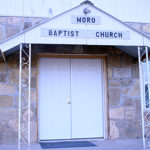• The Bible Studies for Life lesson for Aug. 18 focuses on Luke 22:44-49; Acts 1:6-8; 2:41-47.
The church is God’s plan of hope for the world. After Jesus died and was resurrected, he left the church to do what he had been doing in the world. He commissioned the church to heal, feed and love as he had. We are to be Christ, in the flesh, on this earth. Our task is to make disciples in our cities, countries and throughout the world.
Many churches today struggle just to stay alive. They change things up to stay relevant but still find no success. Jesus told his followers they would be able to do nothing apart from him (John 15). Jesus knew our weaknesses and our struggles firsthand, and he knew his power would be required for us to do anything of eternal value.
Jesus told his disciples to wait for his spirit in order to move forward in the task ahead (Luke 24:44-49). The church, both individually and collectively, must be empowered by the Holy Spirit in order to be effective in our world for Christ.
Presence of the Holy Spirit
Many of us can recall our overwhelming feeling when we first came to know Jesus. Some call it a “spiritual high,” others describe it as “full joy.” The Holy Spirit’s presence in that moment is unmistakable. But as we journey with Christ, at times we doubt the Spirit’s power in our lives.
We wonder what it means to really walk in the Spirit or to be guided by the Holy Spirit. The topic has been researched and discussed by numerous authors and pastors, and we still do not understand fully the Holy Spirit.
Sign up for our weekly edition and get all our headlines in your inbox on Thursdays
Jack Levison, a professor of New Testament at Seattle Pacific University, we describes five common misunderstandings surrounding the work and nature of the Holy Spirit. These misconceptions can hinder our relationship with Christ and our ability to carry out the tasks he has called us to.
First, the Holy Spirit works in spurts. This is not true. Every breath we breathe is another opportunity for the Spirit to work in and through us. The actual Greek word for “spirit” means “breath” or “wind.” We would not survive if we only took breaths in spurts. We constantly must have air in order to keep living. We also need the Spirit every moment of every day. We must seek him with every single breath.
The Spirit’s spectacular work
Second, the Spirit’s work is spectacular. Many of us are standing around waiting for a mountain-top experience. We want something quick and noteworthy to happen in our lives. But we know from Scripture, many times, the Spirit works over a long period of time. Daniel refused to do what was popular in order to gain status. Instead, he opted for a simple obedience through his diet and focused on studying. The Spirit worked in him in unbelievable ways because he was committed to simplicity over a long period of time.
Third, the Spirit is spontaneous. Sure, God has the power to act in any way he sees fit and at any time. But we see the Holy Spirit emerging when people have prepared diligently. If you look at the church in Antioch, in the book of Acts, you will see they grew rapidly. Many of us desire the same sort of growth in our churches today.
The church of Antioch did not have a crazy outreach scheme with fancy videos and brochures. Rather, they studied Scripture under Paul and Barnabas for a year. They were generous with their finances. They lived life together—sharing meals, developing disciplines and praying together. They did these things faithfully, and then the Holy Spirit moved in incredible ways. The Holy Spirit works where the climate has been cultivated.
Commanding ad authoritative
Fourth, the Spirit is commanding and authoritative. Elijah met God, not in the wind of the storm and not in the shattering noise of the earthquake, not in the roar of the fire, but in the sound of a gentle blowing. The Holy Spirit has a still, small voice. In order to hear God’s spirit, we must hush and wait patiently for his voice.
Fifth, the Spirit is safe and gentle. Nothing is safe about the path and life God called his followers to live. In Mark 1:12, the Holy Spirit drove Jesus out into the wilderness just like Jesus drove demons out of the possessed. The Holy Spirit moves with power and moves us to places and opportunities we cannot handle on our own. The Holy Spirit knows we learn best against the odds, and his own power is perfected in our weakness.
If you are expecting God’s Spirit to work in your life in a specific formula or at a specific time, you may be looking in the wrong place and at the wrong time. Levison says: “If you think the Holy Spirit’s work moves suddenly and spontaneously, that it always appears in glamorous and authoritative displays—think again. The Spirit of God is steady—always present and always at work, whether in spectacular or simple ways.”
May our churches be marked by the presence and power of the Holy Spirit, not only during times of revival or big events, but in the daily workings and relationships. He is faithful to equip and empower us for the task to which he has called us. He is constant.













We seek to connect God’s story and God’s people around the world. To learn more about God’s story, click here.
Send comments and feedback to Eric Black, our editor. For comments to be published, please specify “letter to the editor.” Maximum length for publication is 300 words.